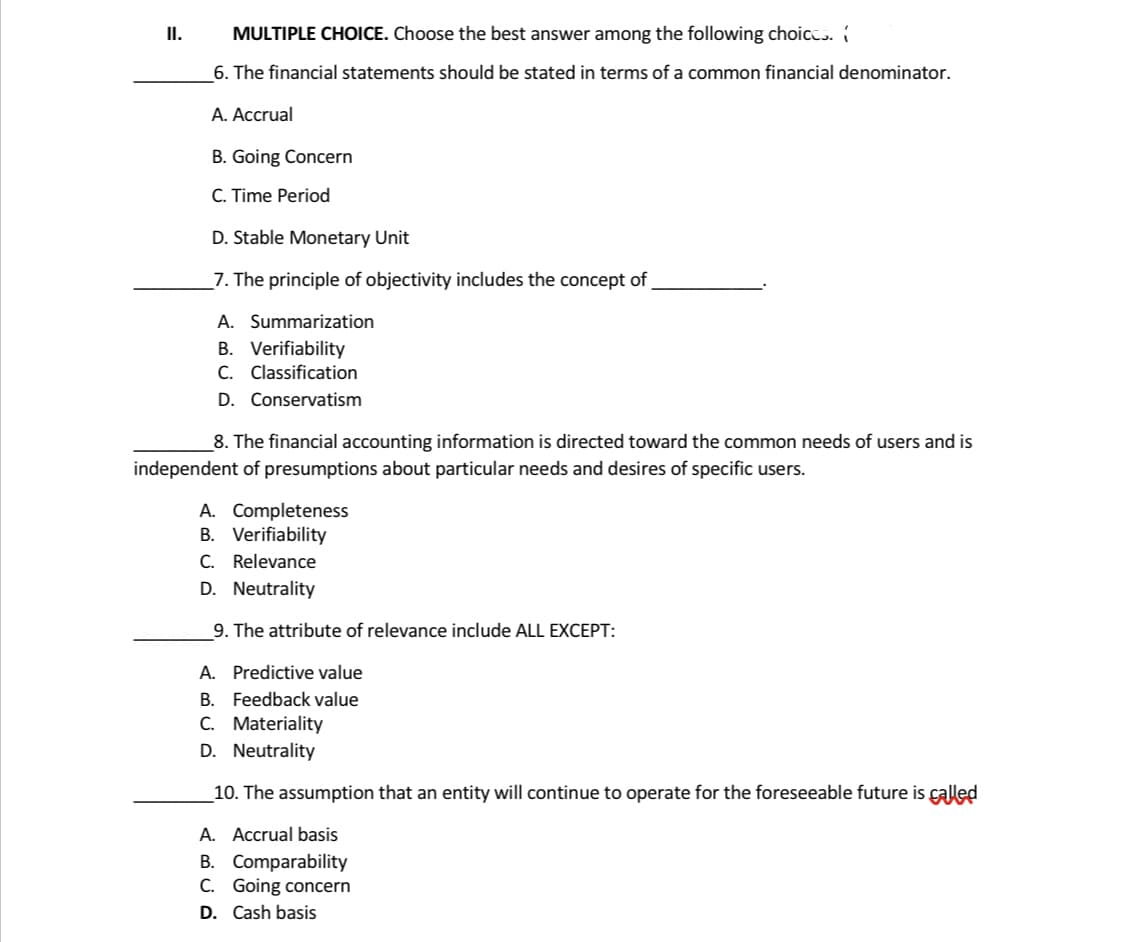6. The financial statements should be stated in terms of a common financial denominator. A. Accrual B. Going Concern C. Time Period D. Stable Monetary Unit
6. The financial statements should be stated in terms of a common financial denominator. A. Accrual B. Going Concern C. Time Period D. Stable Monetary Unit
Intermediate Accounting: Reporting And Analysis
3rd Edition
ISBN:9781337788281
Author:James M. Wahlen, Jefferson P. Jones, Donald Pagach
Publisher:James M. Wahlen, Jefferson P. Jones, Donald Pagach
Chapter2: Financial Reporting: Its Conceptual Framework
Section: Chapter Questions
Problem 7C
Related questions
Question

Transcribed Image Text:MULTIPLE CHOICE. Choose the best answer among the following choices.
6. The financial statements should be stated in terms of a common financial denominator.
A. Accrual
B. Going Concern
C. Time Period
D. Stable Monetary Unit
7. The principle of objectivity includes the concept of
A. Summarization
B. Verifiability
C. Classification
D. Conservatism
8. The financial accounting information is directed toward the common needs of users and is
independent of presumptions about particular needs and desires of specific users.
A. Completeness
B. Verifiability
C. Relevance
D. Neutrality
9. The attribute of relevance include ALL EXCEPT:
A. Predictive value
B. Feedback value
C. Materiality
D. Neutrality
10. The assumption that an entity will continue to operate for the foreseeable future is called
A. Accrual basis
B. Comparability
C. Going concern
D. Cash basis
Expert Solution
This question has been solved!
Explore an expertly crafted, step-by-step solution for a thorough understanding of key concepts.
Step by step
Solved in 2 steps

Knowledge Booster
Learn more about
Need a deep-dive on the concept behind this application? Look no further. Learn more about this topic, accounting and related others by exploring similar questions and additional content below.Recommended textbooks for you

Intermediate Accounting: Reporting And Analysis
Accounting
ISBN:
9781337788281
Author:
James M. Wahlen, Jefferson P. Jones, Donald Pagach
Publisher:
Cengage Learning

Cornerstones of Financial Accounting
Accounting
ISBN:
9781337690881
Author:
Jay Rich, Jeff Jones
Publisher:
Cengage Learning


Intermediate Accounting: Reporting And Analysis
Accounting
ISBN:
9781337788281
Author:
James M. Wahlen, Jefferson P. Jones, Donald Pagach
Publisher:
Cengage Learning

Cornerstones of Financial Accounting
Accounting
ISBN:
9781337690881
Author:
Jay Rich, Jeff Jones
Publisher:
Cengage Learning


Auditing: A Risk Based-Approach to Conducting a Q…
Accounting
ISBN:
9781305080577
Author:
Karla M Johnstone, Audrey A. Gramling, Larry E. Rittenberg
Publisher:
South-Western College Pub

Financial Reporting, Financial Statement Analysis…
Finance
ISBN:
9781285190907
Author:
James M. Wahlen, Stephen P. Baginski, Mark Bradshaw
Publisher:
Cengage Learning

Principles of Accounting Volume 2
Accounting
ISBN:
9781947172609
Author:
OpenStax
Publisher:
OpenStax College